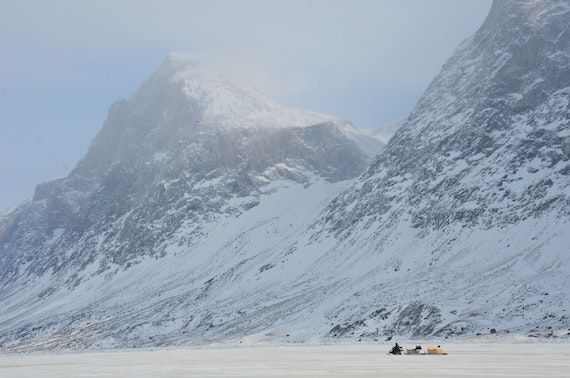(Photo: Isaac Demeester for Unsplash)
CHRONIC. Jens Stoltenberg, Secretary General of the North Atlantic Treaty Organization (NATO), did not travel to Nunavut in Canada’s far north for tourism. Since Russia’s aggression in Ukraine, the Arctic has become increasingly strategic on a military level.
Eight countries are entering the Arctic Circle, which stretches 16,000 kilometers around the North Pole: Canada, Russia, the United States (thanks to Alaska), Denmark (thanks to Greenland), Iceland, Norway, Sweden and Finland. With Sweden and Finland likely to join NATO, seven of these eight countries will be members of this military alliance. These eight countries are members of the Arctic Council, which mainly deals with scientific issues. Since the war in Ukraine, this council has not met, isolating Russia.
The Arctic is occupied by three main countries: Russia with 53% of the coastline of the countries penetrating the Arctic Circle, Canada and Denmark with Greenland. The region is increasingly coveted for its resources and sea routes, which are becoming increasingly accessible as the ice melts. According to the US Geological Survey, the Arctic hosts 25% of the planet’s untapped hydrocarbon reserves. There are also significant mining and fishing resources. Russia’s renewed military aggressiveness has made it an even more strategic territory.
Also, NATO, which had lost its prestige (French President Emmanuel Macron had already declared it “brain dead” and Donald Trump wanted to cut its budget), is now seen as more important in relation to Russia. Like other countries, Canada has pledged to significantly increase its military efforts. The country spends just 1.3% of its GDP on NATO funding, instead of the 2% required of member countries.
The defense of the Arctic is primarily handled by the North American Aerospace Defense Command (NORAD), which unites the United States and Canada. NORAD operates a detection system for Russian military aircraft entering the airspace of the two allies. Canada has pledged to invest $4.9 billion over six years to strengthen NORAD’s ICBM detection capability and plans to spend $38.6 billion over 20 years to to upgrade all of its surveillance and defense capabilities.
Russia militarized
Sergey Lavrov, Russia’s foreign minister, has already stated that “it has long been established that the Arctic is part of our territory”. To The economist, Russia has reactivated at least 50 former USSR military installations in the region. It also promotes the Northern Sea Route (NSR), which connects the Bering and Barents Seas along Siberia. This competes with the Northwest Passage, which is in Canadian waters.
Russia believes that the Lomonosov Ridge, which runs under the North Pole, is an extension of its continental shelf. In 2007, two small Russian submersibles planted a tricolor titanium flag 3km below the North Pole.
China interferes
For its part, China, which defines itself as a “Near-Arctic State,” is trying to make the most of Arctic resources. There it promotes its “polar Silk Road” based on the model of the great “Silk Road” that it is developing to connect Asia and Europe by land and sea. To this end, China is currently building the world’s largest icebreaker. COSCO, China’s third largest container carrier, already uses the NSR. Russia plans to build a deep-water port.
China has a strong presence in the Arctic, where it would have invested $1,400 billion in various projects in several countries including Russia, Canada, Denmark, Iceland, Norway, Sweden and Finland from 2005 to 2017, according to an American report. In Canada, Chinese investment in the mining sector in Nunavut, Yukon, the Northwest Territories, Labrador and North du Quebec would reach about $20 billion.
Accused of allowing a Chinese company to acquire Tanco, which operates a mine with the highest lithium content in the world in Manitoba, and allowing Chinese giant Zijin Mining to buy Canadian company Neo Lithium, whose mine is in Argentina, Ottawa has become more cautious about China. In 2020, Canada blocked the sale of the Shandong Gold Mine in the Arctic to a Chinese company.
Like Russia, which has just unleashed another Cold War, Canada must be wary of China, whose ambitions and financial resources are almost unlimited. President Xi Jinping, fully assuming his imperialism and his disregard for human rights and the rules of international law and trade, is no more reliable than the dictator in Moscow.
Because of this, it is really important that Canada significantly increases its protection of the Canadian Arctic, which mighty vultures are just waiting to plunder.
I like
The financing project to ensure the longevity of the Quebec Bridge presented by businessman Yvon Charest, who served as the independent and volunteer negotiator on this dossier, is credible. Ottawa would buy the bridge from CN and invest $285 million to preserve it. CN would commit to paying $125 million in rent over 25 years, and Quebec would pay $375 million over 25 years, or $2.7 million more per year than it currently pays. While this proposal is viewed by many as reasonable, Quebec says NO…obviously out of political calculation. Please make a little effort to settle this at least 15 year old file!
I do not like it
The generous tax breaks offered by Quebec political parties to voters, regardless of income, are unjustified. While the Bank of Canada is raising interest rates to dampen demand, these cuts would stimulate it. It’s true that Quebec’s tax burden is higher than other provinces, but our society has made a choice to provide better public services, and we’re very proud of it. There is nothing economic about this general distribution of tax treats. She is quite irresponsible and cynical about the state of our public finances and a likely recession. Ottawa will rightly ask Quebec to review its taxation when the latter goes begging for its health services.

Avid beer trailblazer. Friendly student. Tv geek. Coffee junkie. Total writer. Hipster-friendly internet practitioner. Pop culture fanatic.





;Composite=(type=URL,url=https://images.radio-canada.ca/v1/assets/elements/16x9/outdated-content-2013.png),gravity=SouthEast,placement=Over,location=(0,0),scale=1)

